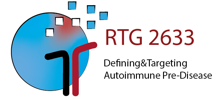Kiana Zarabadi
Exploring Novel Genetic Variants and the Pathogenicity of Autoantibodies in Pemphigus Vulgaris
Pemphigus vulgaris (PV) is a rare, potentially life-threatening autoimmune blistering disease affecting the skin and surface-close mucous membranes. It is characterized by autoantibodies against two desmosomal antigens, desmoglein (Dsg) 1 and 3. These anti-Dsg autoantibodies are detected in nearly all PV patients and are pathogenic, as demonstrated in both in vitro and in vivo studies.
Although familial cases of pemphigus are extremely rare, they are well-documented. Approximately half of the first-degree relatives of PV patients exhibit circulating autoantibodies without clinical lesions. Genetic risk factors, particularly at the HLA locus and to a lesser extent at non-HLA loci, are associated with PV. Notably, the presence of pemphigus-specific autoantibodies in relatives often correlates with the same HLA alleles found in PV patients.
This study aims to identify novel susceptibility loci associated with an increased risk of developing autoantibodies and clinical disease. To achieve this, genome-wide association studies (GWAS) and in vitro functional analyses of anti-Dsg3 IgG will be conducted in PV patients and their first-degree relatives.
By identifying new genetic factors related to the predisposition, onset, and progression of PV, this project may enable early identification of at-risk individuals. Such knowledge could facilitate the development of targeted therapies and personalized medicine strategies for managing pemphigus.

- People
- Doctoral researchers
- Merabell Adem
- Katja Adriany
- Farbod Bahreini
- Aderiike Babarinsa
- Isha Barve
- Estelle Bergmann
- Swayanka Biswas
- Noa Linn Brauckmann
- Christoph Brieske
- Jana Buhre
- David De Luca Laredo
- Felicitas Eichlohn
- Kaan Ersoy
- Ferdinand Gebauer
- Lennart Gooß
- Fatemeh Gorzin
- Maja Grote
- Alanis Barbosa Gulde
- Jiaxi Guo
- Sen Guo
- Veronika Hartmann
- Michelle Hein
- Marie Jaboreck
- Luise Janusch
- Maj Jäpel
- Jakia Khan
- Anna Knauer
- Valentin Kneitz
- Philipp Köcher
- Maximilian Lahmer
- Wing Yu Lee
- Jian Liu
- Isabelle Luckow
- Kristina Manzhula
- Daniel Mehlberg
- Sahar Mehrabani
- Afsaneh Mehrpouyan
- Yasaman Mirzaee
- Sadegh Mousavi
- Danial Namazi
- Dennis Niese
- Roqayeh Noori
- Milica Novovic
- Josepha Nunold
- Ludwig Ohlrogge
- Justus Ohmes
- Bianca Opelka
- Colin Osterloh
- Anne-Sophie Pagel
- Cristian Papara
- Isa Popken
- Tina Rastegar Lari
- Daniel Rohling
- Felix Sajon
- Rochi Saurabh
- Alessia Maria Sbaraglia
- Jovan Schanzenbacher
- Mareile Schlotfeldt
- Carolin Schmidt
- Solveig Lea Schmidt
- Leon Schmidt-Jiménez
- Nora Schoell
- Lena Schröder
- Hannah Schumacher
- Salomini Sinnathurai
- Sarah Stenger
- Lene Sophie Urban
- Chiara Walczyk
- Nele Wellbrock
- Julia Wimmer-Gross
- Pia Witt
- Natalia Zappe
- Kiana Zarabadi
- Jianrui Zheng
- Luca Zillikens
- Carla Zünkeler
- Participating researchers
- Early career researchers
- Administration
- Finished doctoral degrees
- Doctoral researchers



